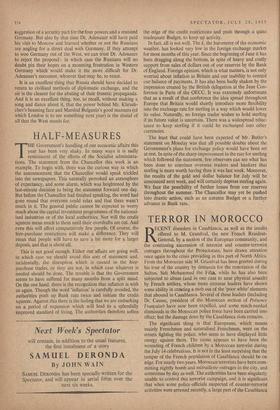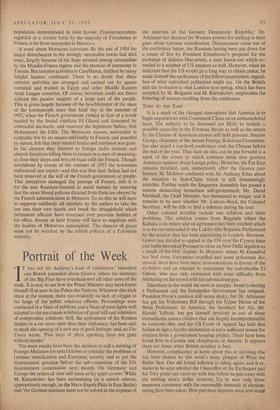TERROR IN MOROCCO
ECENT disorders in Casablanca, as well as the insults offered to M. Grandval, the new French Resident- General, by a section of the European community, and the continuing succession of terrorist and counter-terrorist outrages throughout the Protectorate, have drawn attention once again to the crisis prevailing in this part of North Africa. From the Moroccan side M. Grandval has been greeted during his tour of the country by demands for the restoration of the Sultan, Sidi Mohammed the Fifth, while he has also been subjected to abuse (and in one case to near physical assault) by French settlers, whose more extreme leaders have shown some ability in creating a mob out of the 'poor white' elements that abound in Casablanca. Several of these leaders (including Dr. Causse, president of the Moroccan section of Presence Francaise) have now been expelled, and some much-needed dismissals in the Moroccan police force have been carried into effect; but the damage done by the Casablanca riots remains.
The significant thing is that Europeans, which means mainly Frenchmen and naturalised Frenchmen. were on the streets fighting the police. who seem to have displayed little energy against them. The cause appears to have been the wounding of French children by a Moroccan terrorist during the July 14 celebrations. It is not in the least surprising that the temper of the French population of Casablanca should be on edge. For nearly two years, Moroccan terrorists have been com- mitting nightly bomb and mitraillette outrages in the city, and sometimes by day as well. The authorities have been singularly unable to control this terrorist campaign, and it is significant that when some police ,officials suspected of counter-terrorist activities were arrested recently, a large part of the Casablanca population demonstrated in their favour. Counter-terrorism, regarded as a sinister force by the majority of Frenchmen in France, is far from unpopular in Morocco.
A word about Moroccan terrorism. By the end of 1954 the major disturbances in the strongly nationalist towns had died away, largely because of the hope aroused among nationalists by the Mendes-France regime and the promise of autonomy in Tunisia. But terrorist activities in Casablanca, disliked by many Istiglal leaders, continued. There is no doubt that these terrorist activities are arranged and carried out by agents recruited and trained in Egypt and other Middle Eastern Arab League countries. Of course, terrorism could not thrive without the passive support of a large part of the people. This is given largely because of the bewilderment of the mass of the townspeople since that fatal day in the summer of 1953, when the French government yielded in face of a revolt headed by the feudal chieftain El Glaoui and fomented by colonialist die-hards, and removed the legitimate Sultan, Sidi Mohammed the Fifth. The Moroccan masses, nationalist in sympathy but by no means unfriendly to France, and peaceful by nature, felt that their natural leader and mediator was gone. In his absence they listened to foreign radio stations and obeyed directives telling them to remain in a state of mourning, to close their shops and boycott trade with the French. Though bewildered by events of the summer of 1953 the townsmen understood one aspect—and this was that their Sultan had not been removed at the will of the French government or people. This perception damaged the prestige of France, and it is for the new Resident-General to mend matters by ensuring that the more liberal policies dictated from Paris are obeyed by the French administration in Morocco. To do this he will have to suppress ruthlessly all attempts by the settlers to take the law into their own hands, and break the stranglehold which permanent officials have exercised over previous holders of his office. Sooner or later France will have to negotiate with the leaders of Moroccan nationalism. The chances of peace must not be wrecked by the selfish policies of a European minority.



































 Previous page
Previous page